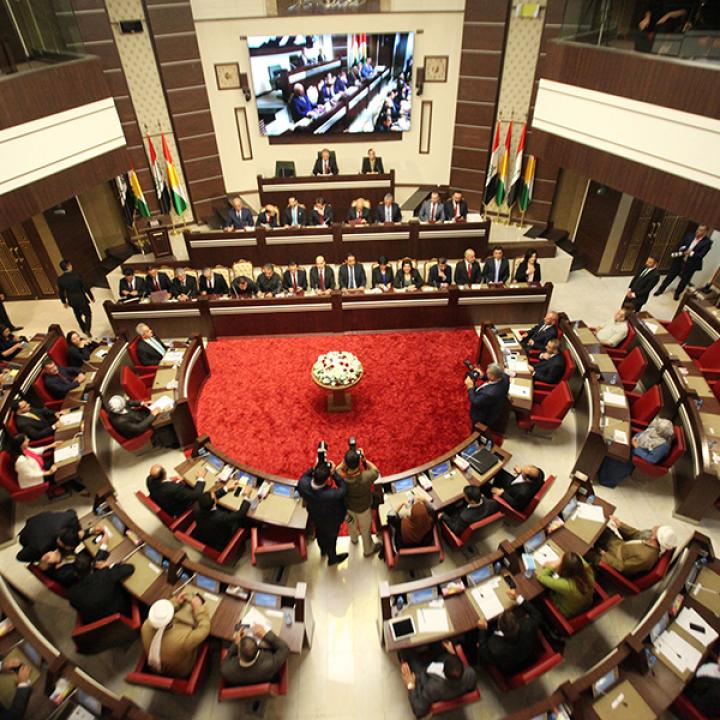
- Policy Analysis
- Fikra Forum
Addressing Violence Against Women in Iraqi Kurdistan

Hate speech and social dialogue have given rise to increased levels of violence against women in the KRI.
Every other week, a woman or young girl is killed to protect a man’s honor in the Kurdistan Region of Iraq (KRI). The killers are usually close relatives of the victims—on March 18, a 20-year-old was killed by her brother.
In actuality, more honor killings occur than what is reported, particularly in rural areas. Moreover, even within reported cases, violence against women and girls is on the rise, which is surprising given high rates of women’s literacy, internet access, and university enrollment. In that context, understanding what is pushing men to kill women and girls for the sake of their honor is vital to addressing the problem.
We are living at a time when cultural changes are rapidly developing in the KRI. Women and girls are increasingly aware of civil liberties and freedoms. More women are participating in the workforce than ever before—something we should all applaud.
We are seeing the highest numbers of NGOs, women’s advocates and women-allied lawmakers, yet violence against women continues to rise. The consequences will continue across the KRI; gender-based violence has impacts on economy, development, education and health, among other sectors.
In the KRI, the problem is not a lack of legislation regarding honor killings; rather, the issue is the limitations on extant legislation’s application and effects. Legislation alone cannot shift cultural attitudes. For cultural attitudes to change, our society needs a national dialogue frankly addressing the issue and its damaging effects. Additionally, verbal condemnation must be backed up with harsh punishments for perpetrators. Without societal and legal deterrents, instances of violence against women are likely to continue.
At present, societal factors actually appear to be encouraging violence against women. Hate speech against women has become normalized on social networking sites in the Kurdistan Region. When news platforms share honor-killings, a significant number of people “praise” the perpetrators and justify the heinous act of killing in the name of honor. There is no requirement that news platforms monitor this sort of activity, making it difficult for the government to challenge this narrative.
This kind of rhetoric was on full display in response to the murder of Eman Sami Maghdid, who was killed by her brother on the street. On Facebook, side-by-side images of Maghdid circulated: in one, she is wearing a headscarf, and in the other, she is smoking a cigarette. The caption read “this is the aftermath of joining a women's rights organization.” Hundreds of commenters likewise expressed their support for her murder on prominent news platforms, applauding the killer for being “man” enough to restore honor to his family.
It is important to also acknowledge the benefits that social media platforms have provided to Kurdish women. Nazreen Bacchus, an academic at Pace University, emphasizes that social media can bring “a high demand of employment opportunities for women in developing nations, creating instantaneous change within the social structure of these societies.” Social media has also enabled women and young girls to connect with women in other countries who have greater freedoms—prompting accusations by some that these women are “rebellious” and influenced by Western ideas in the process.
In fact, the rapidity of the rate of change that social media allows has meant that the KRI’s educational system has not been able to keep pace with the developments in women’s rights. Sadly, we have neglected improving the education system on a primary and secondary level to ensure we are teaching young girls and boys about equality and diversity. There are significant reasons why this is the case—the KRI has focused on survival and healing from the trauma of genocidal campaigns and civil war. Given the region’s tumultuous history, there has been little time for changes to appear gradually in society. Current challenges range from an ongoing water crisis to threats from Iran that have led to missile attacks on the capital, and growing tensions with Baghdad over several key issues of governance.
Instantaneous access to the outside world prompted major changes in women’s roles, activities, and preconceived notions about appropriate behavior, and these developments are being challenged in an ugly, violent manner. Yet when stacking the issues facing the KRI in terms of importance, women are not seen as a priority and are not treated as such. It is becoming increasingly unlikely that women will be seen as a main priority for the Kurdistan Regional Government as it faces growing internal discord over austerity measures, high levels of youth unemployment and inability to pay civil servant salaries in full and on time.
As such, the first hurdle for women and men who advocate for equality is to ensure that the ongoing killing of women is understood as a top priority in the KRI—one that must be contained and reduced. Without a change of perception, we are not going to see measures in place that will effectively contain the scale of violence.
The government lacks the public incentive to fully engage on this subject because the public are simply not outraged enough, despite one woman being killed every week for the past eleven weeks. If greater public outrage and condemnation became prominent, and received widespread attention on social media platforms, it is possible that more measures would be put in place by the Kurdish government to contain the scale of violence against women.


